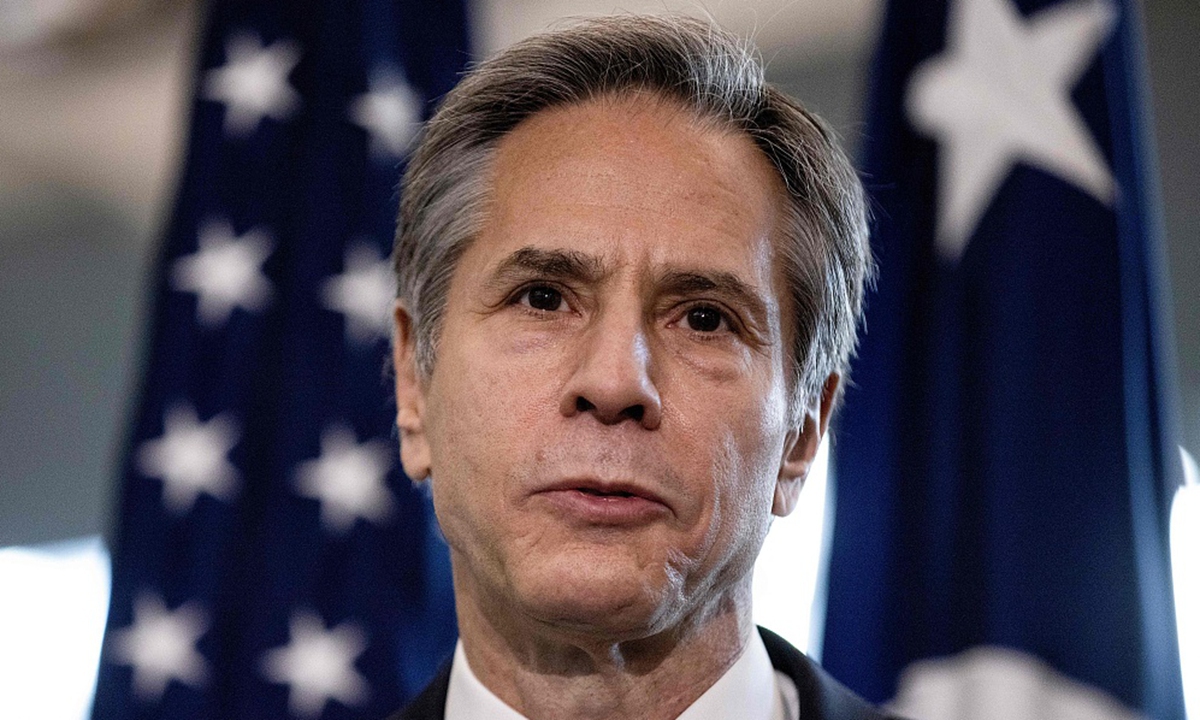
US Secretary of State Antony Blinken. Photo: VCG
US Department of State announced that US Secretary of State Antony Blinken will visit China from April 24 to 26. This arrangement is in line with widespread expectations around the world. China's Ministry of Foreign Affairs has previously said China welcomes Blinken's visit to China. After the phone call between the two heads of state early this month, the momentum of stabilizing China-US relations has been further promoted and consolidated, which means new stability and certainty for China, the US and the world. Both sides still "embrace open lines of communication." It is also an opportunity that needs to be grasped by both countries to meet each other halfway.
This is Blinken's second visit to China in less than a year, following a visit by US Treasury Secretary Janet Yellen. According to a US State Department official, Blinken's trip has three primary objectives, including making progress on key issues, communicating concerns on bilateral, regional and global issues, and "responsibly managing competition" to avoid miscalculation or conflict. It is not difficult to find that one of the primary goals during Blinken's trip, as the top US diplomat, is to maintain the overall stability of China-US relations and avoid falling into confrontation and conflict. It should be said that China and the US have a great consensus on this point, which is also the premise and basis for the interaction between the two countries.
We have noticed that many Western media outlets have highlighted the aim of Blinken's visit to "impose pressure on" China, including warning China not to "help Russia" and avoid "provocation" on the Taiwan question. These reports try to convey an overall impression that Blinken is coming to lecture China, and that if China does not accept the US' warning, it is "destroying the stability." Whenever there is a new opportunity for communication or détente between China and the US, there are always some people who jump out in advance to create public opinion and issue unreasonable warnings to China. They simply want to add to the bargaining chip of Blinken's visit and ask for a higher price, which is their usual tactics. This trick is already familiar to the Chinese and will not have any impact on the Chinese side.
In this sense, we actually want to give the US a "preventive shot" in advance, that is, never hold any mentality of "suppressing China," as doing so will only have a negative effect on communication between the two sides. In fact, seeking cooperation with China on hot regional issues such as the Ukraine crisis and the Israel-Palestine conflict is one of the key topics of Blinken's visit to China this time. In addition, the US also hopes that China can "do a favor" on issues such as fentanyl. These are currently pressing issues for the Biden administration. Just half a month ago, US Treasury Secretary Yellen, who visited China, also sought cooperation with China on some issues. In this sense, the US should especially lower its posture, show full respect to China, and demonstrate its sincerity.
In dealing with the US, the principles and bottom lines of the Chinese side have always been clear, visible, highly consistent and stable. China is willing to promote the stability and improvement of China-US relations through dialogue. At the same time, the Chinese value reciprocity, and dialogue must be based on mutual respect and equality. The US cannot deliberately contain and suppress China, harming China's legitimate rights and interests, while expecting China to support and cooperate on the issues it needs, as China has repeatedly emphasized before. Blinken recently declared in Europe that China "can't purport to want to have positive, friendly relations with countries in Europe and at the same time be fueling the biggest threat to European security since the end of the Cold War." This is a typical case of shifting blame. In response to this, we would like to say that if the US hopes to avoid conflict and achieve stability with China, it cannot encourage or even directly create threats to China's national security. As for what these threats are, the US knows very well.
President Xi Jinping pointed out in a recent phone call with President Joe Biden that two big countries?like China and the US should not cut off their ties or turn their back on each other, still less slide into conflict or confrontation. From any perspective, we sincerely hope China-US relations to return to the right track, and are willing to work together with the US to make progress in Blinken's visit and future interactions. Of course, this requires the US to correct its attitude and show sincerity.




